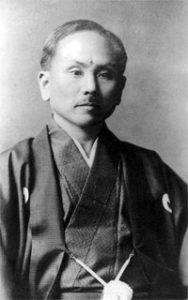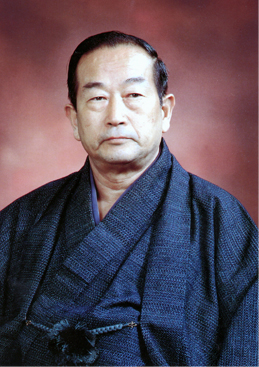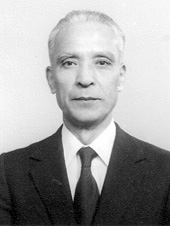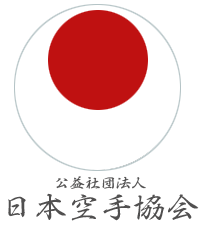Shōtōkan (松濤館 ) Karate (空手) is a traditional Japanese Martial Art founded by Master Gichin Funakoshi. Shōtōkan Karate remains firmly rooted in a strong martial arts tradition. It emphasises a lifetime of training for a healthier mind and body, rather than for sport.
Shōtōkan Karate is predominantly a weaponless martial art style that is founded on the basic physical techniques of punching, striking, kicking and blocking. The power from these techniques largely relies on the movement of the hips. As you progress higher up the ranks there becomes a deeper psychological component to serious Karate training which develops character.
Amongst other styles, Shōtōkan Karate is a way for an individual to realise greater potential and expand the limits of one's Physical and Psychological capabilities. Karate-Dō is a time-proven method of personal and mental development.
"Karate-Do strives internally to train the mind to develop a clear conscience, enabling one to face the world honestly, while externally developing strength to the point where one may overcome even ferocious wild animals. Mind and technique become one in true karate" - Master Gichin Funakoshi.
The Influence of Master Funakoshi
The Influence of Master Funakoshi

Master Gichin Funakoshi is widely considered the primary "father" of modern Karate due to his efforts to introduce the Okinawan art to mainland Japan, from where it spread to the rest of the world. Funakoshi Gichin was also the founder of what is now known as Shōtōkan Karate.
Funakoshi was born in 1868 in Shuri, then the capital city of the island of Okinawa. He started practicing Karate while in primary school but didn't begin his mission of spreading it to the outside world until he was 53.
Master Funakoshi taught a synthesis of the Okinawan styles as a total discipline. This method became known as Shōtōkan (literally “House of Shōtō,” Funakoshi’s pen name as a poet). Because the style became very popular in Japan and proceeded to spread throughout the world, Funakoshi is widely considered to be the “father of modern karate-do.” Learn more on Master Gichin Funakoshi.
Carrying On the Spirit and Tradition
Carrying On the Spirit and Tradition
 It could be argued that no person has done more to expand Shotokan karate around the the World, thus carrying on the legacy of Gichin Funakoshi, than his long time student and anointed successor, Masatoshi Nakayama.
It could be argued that no person has done more to expand Shotokan karate around the the World, thus carrying on the legacy of Gichin Funakoshi, than his long time student and anointed successor, Masatoshi Nakayama.
With the permission of Master Funakoshi, Nakayama and some of the other senior students formed the Nihon Karate Kyokai – Japan Karate Association (JKA) in 1949. Master Fuankoshi was named as chief instructor with Nakayama as chief technical adviser.
Nakayama guided the JKA through its difficult early days and through his hard work made it into one of the biggest and most respected Shotokan associations in the world. Many of the students trained by Nakayame describe him as a tough but fair teacher. Learn more on Master Nakayama Masatoshii.
A Lifetime of Devotion to Karate
A Lifetime of Devotion to Karate
 Master Sugiura Motokuni was born on Oct 4, 1924 in Aichi Prefecture. His karate career began in his youth, when he became a student of Shotokan karate. At university he studied under Supreme Master Funakoshi Gichin, and especially with Funakoshi’s second son Yoshitaka. He attained his 1st Dan at age 20.
Master Sugiura Motokuni was born on Oct 4, 1924 in Aichi Prefecture. His karate career began in his youth, when he became a student of Shotokan karate. At university he studied under Supreme Master Funakoshi Gichin, and especially with Funakoshi’s second son Yoshitaka. He attained his 1st Dan at age 20.
After graduation in 1944, Master Sugiura spent a year in the Tsuchiura Navy Flying Corps, but he soon returned to the martial art he loved, resuming his karate training under Master Nakayama Masatoshi while holding a job at a junior college in Tokyo. During these years, he attained the rank of 3rd Dan.
In 1955, Master Sugiura gave up his job at the junior college and began working full-time in the JKA’s Guidance Division. He was also appointed director of the JKA, and assigned to managing the instructors at the headquarters dojo. Learn more on Master Sugiura Motokuni.
What is the JKA?
What is the JKA?
Japan Karate Association (日本 空手 協会; Nihon Karate Kyokai) is one of the most influential Shōtōkan Karate organisations in the world. It is also one of the oldest Karate organisations continuously in operation until the present.
Since the formation of the Japan Karate Association in May 1954, JKA have been consistently promoting the guidance of Karate-dō until today, but from the beginning JKA train professional instructors who completed their own curriculum. JKA have established a solid foundation.

Shōtōkan Karate Benefits
Shōtōkan Karate Benefits
"True karate is this: that in daily life one’s mind and body be trained and developed in a spirit of humility, and that in critical times, one be devoted utterly to the cause of justice" - Master Gichin Funakoshi
Shōtōkan Karate is a holistic practice that benefits the student in all areas of their life. Karate encourages proficiency in the physical form as well as the co-ordination of the mind and body. It is an art where advancing age can be beneficial, as life experience and maturity can further assist with mental discipline.
Karate practice:
- strengthens the mind, develops composure and a clearer thought process
- develops self-confidence and self-esteem
- strengthens the entire body, improves coordination, quickens reflexes, builds stamina and overall health
- teaches the values of courtesy, integrity, humility, justice, honor, and self-control
Master Gichin Funakoshi said that “mind and technique are to become one in true karate.” We endeavor to make our physical techniques reflect our mind’s intention. Through consistent Karate practice we are strengthening the connection between mind, body and spirit. For example, when we consciously try to identify and eliminate weak and indecisive movements in our Karate practice, it can help us to eliminate weakness and indecision in our minds—and vice versa.

